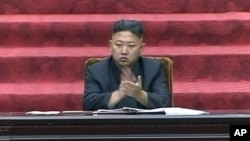South Korea says it is disappointed that North Korea failed to announce any economic reforms that some expected to be passed during a rare session of parliament held this week in Pyongyang.
Sources said to be close to North Korean leadership tell Western news agencies that the impoverished, authoritarian state may soon allow farmers to keep more of their produce, in a move to increase agricultural production.
But the North Korean Central News Agency made no mention of the reforms in its coverage of the largely ceremonial session of the Supreme People's Assembly, which was attended by new leader Kim Jong Un.
In a statement Wednesday, South Korean President Lee Myung-bak says he and other top leaders in Seoul are disappointed the session did not yield any measures to "improve the lives of ordinary North Koreans."
Observers have been watching closely for signs that Kim Jong Un is open to market reforms since he took power following the death of his father Kim Jong Il in December.
Since this is only the third time in the past decade that the Supreme People's Assembly has met more than once in the same year, some speculated that he may use the event to announce reforms.
Among those reforms rumored to have been considered, farmers would be allowed to keep a much larger portion of what they produce -- which they could sell in the market, giving them incentive to produce more.
Currently farmers in North Korea are required to turn over most of their produce to the state, keeping only what they need for their families. North Korea's agricultural sector has struggled to produce enough food for the country's 24 million people.
But the KCNA report said that the rubber stamp (ceremonial) parliament only decided to extend compulsory schooling from 11 to 12 years and make a minor reshuffle in its standing committee.
Observers said failure to mention the economic reforms do not necessarily mean they are not being considered, but that the Communist party may not be ready to move such reforms beyond possible trial stages.
Sources said to be close to North Korean leadership tell Western news agencies that the impoverished, authoritarian state may soon allow farmers to keep more of their produce, in a move to increase agricultural production.
But the North Korean Central News Agency made no mention of the reforms in its coverage of the largely ceremonial session of the Supreme People's Assembly, which was attended by new leader Kim Jong Un.
In a statement Wednesday, South Korean President Lee Myung-bak says he and other top leaders in Seoul are disappointed the session did not yield any measures to "improve the lives of ordinary North Koreans."
Observers have been watching closely for signs that Kim Jong Un is open to market reforms since he took power following the death of his father Kim Jong Il in December.
Since this is only the third time in the past decade that the Supreme People's Assembly has met more than once in the same year, some speculated that he may use the event to announce reforms.
Among those reforms rumored to have been considered, farmers would be allowed to keep a much larger portion of what they produce -- which they could sell in the market, giving them incentive to produce more.
Currently farmers in North Korea are required to turn over most of their produce to the state, keeping only what they need for their families. North Korea's agricultural sector has struggled to produce enough food for the country's 24 million people.
But the KCNA report said that the rubber stamp (ceremonial) parliament only decided to extend compulsory schooling from 11 to 12 years and make a minor reshuffle in its standing committee.
Observers said failure to mention the economic reforms do not necessarily mean they are not being considered, but that the Communist party may not be ready to move such reforms beyond possible trial stages.









